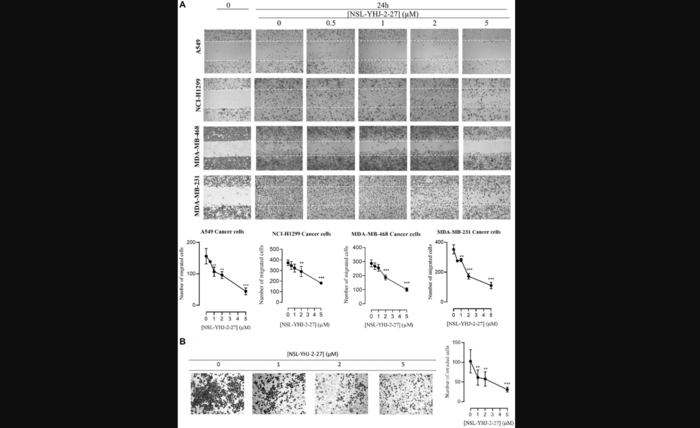“[…] mutations in G-proteins have been associated in the progress of several cancers […]”

Credit: 2023 Tawfeeq et al.
“[…] mutations in G-proteins have been associated in the progress of several cancers […]”
BUFFALO, NY- March 28, 2023 – A new research paper was published in Oncotarget’s Volume 14 on March 24, 2023, entitled, “Polyisoprenylated cysteinyl amide inhibitors deplete singly polyisoprenylated monomeric G-proteins in lung and breast cancer cell lines.”
Finding effective therapies against cancers driven by mutant and/or overexpressed hyperactive G-proteins remains an area of active research. Polyisoprenylated cysteinyl amide inhibitors (PCAIs) are agents that mimic the essential posttranslational modifications of G-proteins. It is hypothesized that PCAIs work as anticancer agents by disrupting polyisoprenylation-dependent functional interactions of the G-Proteins.
In their new study, researchers Nada Tawfeeq, Jassy Mary S. Lazarte, Yonghao Jin, Matthew D. Gregory, and Nazarius S. Lamango from Florida A&M University College of Pharmacy Pharmaceutical Sciences and Imam Abdulrahman bin Faisal University tested this hypothesis by determining the effect of the PCAIs on the levels of RAS and related monomeric G-proteins.
“To investigate the hypothesized anticancer mechanisms of the PCAIs through disruption of G-protein function, we checked the effects of the PCAIs on the G-protein levels in lung cancer (A549 and NCI-H1299) and breast cancer (MDA-MB-231 and MDA-MB-468) cell lines.”
Following 48 hours of exposure, they found significant decreases in the levels of KRAS, RHOA, RAC1, and CDC42 ranging within 20–66% after NSL-YHJ-2-27 (5 μM) treatment in all four cell lines tested, A549, NCI-H1299, MDA-MB-231, and MDA-MB-468. However, no significant difference was observed on the G-protein, RAB5A. Interestingly, 38 and 44% decreases in the levels of the farnesylated and acylated NRAS were observed in the two breast cancer cell lines, MDA-MB-231, and MDA-MB-468, respectively, while HRAS levels showed a 36% decrease only in MDA-MB-468 cells.
Moreover, after PCAIs treatment, migration, and invasion of A549 cells were inhibited by 72 and 70%, respectively while the levels of vinculin and fascin dropped by 33 and 43%, respectively. Their results show that PCAIs deplete the protein levels of some significant G-proteins which are known to be involved in the migration and invasion of cells (i.e., metastasis) such as RAC1, RHOA, and CDC42. These findings implicate the potential role of PCAIs as anticancer agents through their direct interaction with monomeric G-proteins.
“The initial findings presented here indicate how PCAIs can be used as potent agents in developing new anticancer therapeutics, therefore, more extensive studies need to be done to elucidate on its potency. Although we cannot conclusively explain the exact mechanism of action of PCAIs on how they affect the levels of some G-proteins yet, but we can say that these PCAIs have the ability to affect the progression of cancer.”
Read the full research paper: DOI: https://doi.org/10.18632/oncotarget.28390
Correspondence to: Nazarius S. Lamango
Email: [email protected]
Keywords: PCAIs, G-proteins, KRAS, RHOA, RAC1
About Oncotarget: Oncotarget (a primarily oncology-focused, peer-reviewed, open access journal) aims to maximize research impact through insightful peer-review; eliminate borders between specialties by linking different fields of oncology, cancer research and biomedical sciences; and foster application of basic and clinical science.
To learn more about Oncotarget, visit Oncotarget.com and connect with us on social media:
- YouTube
- LabTube
- Soundcloud
Click here to subscribe to Oncotarget publication updates.
For media inquiries, please contact: [email protected].
Oncotarget Journal Office
6666 East Quaker Str., Suite 1A
Orchard Park, NY 14127
Phone: 1-800-922-0957 (option 2)
###
Journal
Oncotarget
DOI
10.18632/oncotarget.28390
Method of Research
Experimental study
Subject of Research
Cells
Article Title
Polyisoprenylated cysteinyl amide inhibitors deplete singly polyisoprenylated monomeric G-proteins in lung and breast cancer cell lines
Article Publication Date
24-Mar-2023




